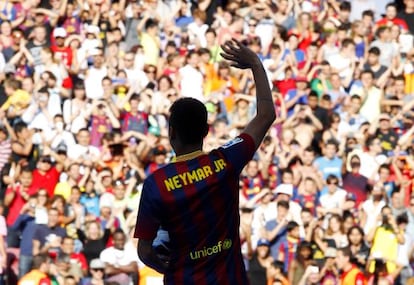Investment funds alter playing field
The lack of money in La Liga has led many clubs to jump into bed with third-party owners More than 50 players are not the property of their teams

Neymar and Radamel Falcao have more in common than the fact they are two of the summer’s biggest signings: they are also examples of a new way of doing business in soccer that involves investment funds, billionaire foreign owners and intermediaries that not even the clubs can fully explain.
How is it that Falcao, a formidable striker at his peak, renounced the chance to play in the Champions League to move to Monaco, a newly promoted Ligue 1 side bankrolled by Russian businessman Dmitry Rybolovlev? Atlético Madrid — which used Doyen, a company that invests in various branches of soccer, to obtain the Colombian — says only that it received 45 million euros for the transfer.
His final destination was unexpected, but explainable by his salary of 14 million euros a year, the financial needs of Atlético, the interests of Falcao’s agent Jorge Mendes and the wishes of his family. But the transfer left soccer fans with a sense of confusion that is not uncommon when investment funds are involved.
Neymar’s 57-million-euro transfer to Barcelona did not involve intermediaries according to the club, which cited a confidentiality clause prohibiting the details of the share of that fee between his former team, Santos, and the three companies that own a stake in his economic rights.
Born in South America, the formula is banned in the UK, France and Poland
Many Liga clubs are turning to these sorts of deals as the banks remain reluctant to lend and other investors desert the Spanish league. Up to 54 players are not owned by their clubs and Sporting Gijón has even partly placed its academy in the hands of an investment fund. Uefa wants third-party ownership banned, while Spanish LFP president Javier Tebas has called for it to be regulated.
The first case in Spain was that of Roberto, who moved to Zaragoza from Benfica for 8.5 million euros in 2011 when the Liga club was seeking protection from its creditors. Unable to pay its debts, Zaragoza somehow acquired the goalkeeper, whose fee was paid by an investment fund.
The modus operandi of these speculators is to invest in young players and not buy more than 50 percent of their rights to share the risk with the club, in return for a proportional share of future transfer fees. If the player is sold within the timeframe agreed — four years is a standard period — the club returns the original investment plus interest.
The formula was born in South America and although it is banned in the UK, France and Poland, it has been gradually establishing itself across Europe. In Portugal, the biggest clubs have their own investment funds, most of them devised by Banco Espírito Santo. The funds have been in operation since 2009 with the clubs holding a 15-percent stake. The system has resulted in profitability of 35 percent for participants. By holding a share of the fund, the club reaps a double reward for transfers.
Uefa believes the use of these investment funds is morally wrong
In Spain, Doyen, which started out as a shirt sponsor for Atlético, Getafe and Sporting before moving into player investments, has interests in Miroslav Stevanovic, Alberto Botía and Geoffrey Kondogbia, to name a few, as well as its slice of Falcao. However, unlike Portugal, where clubs are listed and obliged to report their financial movements, Spain has no such laws in place.
“We have nothing to hide. We comply rigorously with the rules,” said Nelio Lucas, the head of Doyen in Spain, flanked by agents Juanma López and Mariano Aguilar at a seminar on sports law at Madrid’s Juan Carlos I University. “We front the money and there is no pistol to anybody’s head.” Lucas does not give interviews.
Uefa, though, does not see things in quite the same way. The European soccer authority believes the use of investment funds is morally wrong, for the reason that the more a player is moved about, the more money the fund makes, which could lead to players being transferred against their wishes. It is also concerned that the integrity of competition could be compromised because funds may have interests in several teams and, above all, because they are “incompatible with financial fair play rules.”
Fifa and the AFA Spanish Footballers Association warn that investment funds inflate the market and cause losses at the clubs, which essentially hand over one of their main assets: the squad. “It’s food for today and hunger for tomorrow,” said a source who asked not to be identified.
On the other side of the coin are the businessmen behind these funds and in many cases the clubs themselves, who rely on their investments to move in the transfer market. “The future of soccer, and not just in Spain, is that the funds cooperate with the clubs,” said Carlos Suárez, president of Valladolid, at the same Madrid seminar. Many of his colleagues agree. Even Tebas, the new president of the LFP, says the funds have prevented the bankruptcy of some Spanish clubs and believes the system should be regulated, not banned. Among Tebas’ suggestions to counter Uefa’s concerns are that the funds should only be able to hold a limited number of players at the same team and limits should be imposed on the number of youth players who can be added to a fund’s roster.
“As in every sector, there are good funds and there are bad funds,” say Alfredo Garzón and Javier Ferrero, of Senn Ferrero & Asociados, the most active fund in Spain and Doyen’s representative. “It would be best to regulate them, because the majority are audited.
“Our clients do not have any qualms about making information available to the regulators, as clubs in Portugal do and as Spanish clubs do to the league authorities. But many clubs fear going any further [with transparency] because fans tend not to understand these operations.”
Tu suscripción se está usando en otro dispositivo
¿Quieres añadir otro usuario a tu suscripción?
Si continúas leyendo en este dispositivo, no se podrá leer en el otro.
FlechaTu suscripción se está usando en otro dispositivo y solo puedes acceder a EL PAÍS desde un dispositivo a la vez.
Si quieres compartir tu cuenta, cambia tu suscripción a la modalidad Premium, así podrás añadir otro usuario. Cada uno accederá con su propia cuenta de email, lo que os permitirá personalizar vuestra experiencia en EL PAÍS.
¿Tienes una suscripción de empresa? Accede aquí para contratar más cuentas.
En el caso de no saber quién está usando tu cuenta, te recomendamos cambiar tu contraseña aquí.
Si decides continuar compartiendo tu cuenta, este mensaje se mostrará en tu dispositivo y en el de la otra persona que está usando tu cuenta de forma indefinida, afectando a tu experiencia de lectura. Puedes consultar aquí los términos y condiciones de la suscripción digital.









































